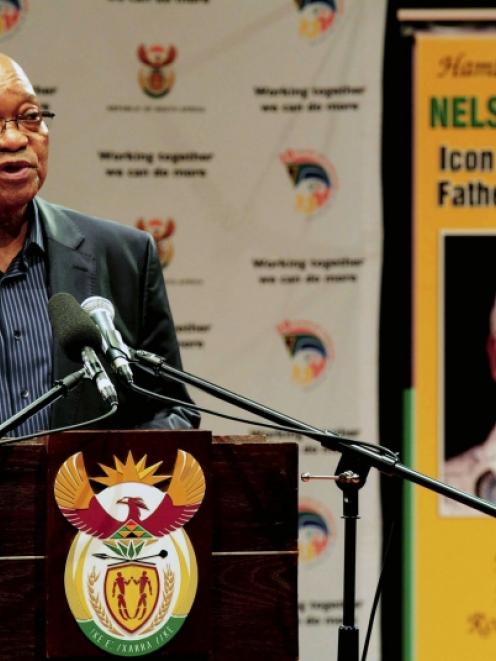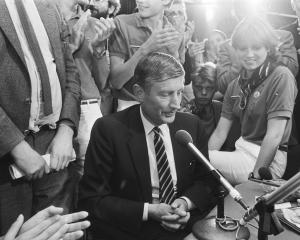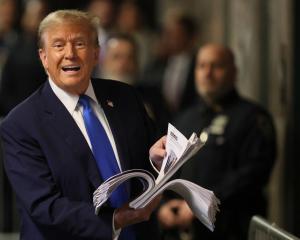
Seven days later, he has gained some political respite through the death of anti-apartheid leader Nelson Mandela, an event of such enormity in the "Rainbow Nation" that Zuma's troubles could be banished from headlines well into next year.
Seldom comfortable in set-piece events, Zuma delivered the news of Mandela's passing late on Thursday (local time) with rare gravitas - a very different figure from the cartoon character depicted sipping a cocktail and floating in a pool of cash in last week's Mail and Guardian newspaper.
The weekly dealt Zuma a serious blow with a report alleging the security upgrade to his Nkandla home included a cattle enclosure and swimming pool - referred to in state documents as a "fire pool" on the grounds it could double up as a water reservoir for fire-fighting purposes.
"It's been a very tough couple of weeks for Zuma, this week in particular with all the fallout from Nkandla," said William Gumede, a political analyst at Johannesburg's Wits University.
"But Mandela might offer him some kind of reprieve. At least people's minds are off him for the time being."
The ANC has stood by Zuma over the Nkandla accusations, saying it believed he had done no wrong. The president's office has not commented.
"DAY IN HISTORY"
The 101-year-old African National Congress (ANC), which has ruled South Africa since the end of apartheid in 1994, is also likely to make political hay out of Mandela's passing, especially with an election less than six months away.
Although there is no chance of the former liberation movement losing its overall majority in Africa's biggest economy, its share of the vote has been waning since the advent of democracy. In 2009 it won fewer than two thirds of votes for the first time.
With so-called "Born Free" post-apartheid voters coming on to the electoral roll for the first time in 2014, unencumbered by the emotional ties of their parents to the liberation struggle, analysts say that percentage could drop sharply.
However, Mandela's death and the 10-day funerary proceedings that are set to follow are likely to serve as a reminder to young South Africans of the huge sacrifices made by "Madiba", as he is affectionately known, and his party.
Businessman Philip Sikhumbuzo, 35, reflected the feelings of many when he woke his two small children in the middle of the night and took them, still in their pyjamas, to Mandela's Johannesburg home minutes after Zuma's announcement.
"It's late but this is one day in history and I want my children to remember who Mandela was," the 35-year-old told Reuters.
NO COMPARISON
However, putting Mandela front and square in its election campaign also carries risks for the ANC, not least because it will merely highlight the yawning gulf in stature between South Africa's first black president and its fourth.
Besides the Nkandla imbroglio, Zuma's five years in office have been tainted by scandals and gaffes, from the fathering of a love-child with the daughter of a close friend, to a dismissive quip about the state of the roads in nearby Malawi.
Before he came into office in 2009, the polygamous Zulu traditionalist had a record that prompted Germany's Stern magazine to refer to him as "The Black Berlusconi", a comparison to the scandal-plagued Italian politician.
He was tried in 2006 for rape. Although he was acquitted, he admitted he had failed to wear a condom despite knowing his partner was HIV positive, and had taken a shower after sex to minimise the risk of infection, raising serious questions about his judgment.
Three years later, he escaped trial for corruption relating to a multi-billion arms deal when state prosecutors withdrew charges just days before the election.
Mandela, by contrast, was held up as a pillar of probity and virtue, a man who, on trial for his life, stood up in the dock in 1964 and declared he was prepared to die in his quest for a democratic and free South Africa.
"The ANC mobilisation and public face will be very much represented by Mandela for now, so it does allow the focus to go off Jacob Zuma, and in the election the ANC will in effect be fronting itself with Nelson Mandela," said independent political analyst Nic Borain.
"It's an appropriate strategy given the kind of trouble the president has been in, but there is a downside to that - that the comparison between the two becomes impossible to ignore."












